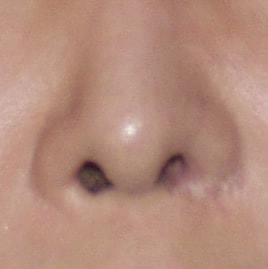Many patients online have inquired about whether or not they can undergo alar base reduction (narrowing) following rhinoplasty. The answer is – yes. In many cases of rhinoplasty and revision rhinoplasty, patients can benefit from having the base of the nose narrowed at the same time other areas of the nose are being reshaped. There are cases, however, when narrowing the alar base is considered a borderline decision. In these types of rhinoplasty and revision rhinoplasty patients, I will usually not do the alar base reduction or narrowing at the time of the surgery. Instead, I reshape the nose and perform all other maneuvers without touching the alar base. After several months of healing, you can usually begin to see if additional alar base narrowing would add to the cosmetic improvements. If so, alar base reduction can typically be performed in the office setting under local anesthesia with minimal downtime. You might be asking why not just perform the alar base narrowing at the time of the rhinoplasty or revision rhinoplasty? The answer is because alar base reduction or narrowing can be somewhat unforgiving. Meaning, it is incredibly difficult to reverse this process once done since you are removing a segment of soft tissue from the nose and altering the natural curvature of the nasal base. For example, look at the attached photo of a patient who consulted with me for possible revision rhinoplasty following surgery (including alar base narrowing) by another plastic surgeon. If you look at her alar base, there is significant scarring, which happens to be quite asymmetric. Unfortunately, in cases like this, it is incredibly difficult to restore a natural appearing contour in this region. If there is an obvious indication to narrowing the base, such as in many ethnic rhinoplasty patients, then by all means this should be done at the time of the surgery. But in my opinion, you are much better off taking a conservative approach to reshaping the nasal base if it is a borderline situation. Keep this in mind when consulting with your rhinoplasty surgeon.

